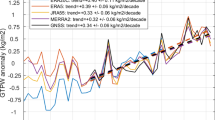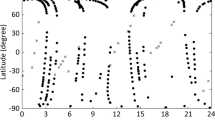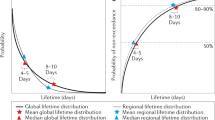Abstract
MESSRS. GOLD AND HARWOOD in their paper on the present state of our knowledge of the upper atmosphere, printed in the British Association's reports for 1909, give a table showing the mean temperatures for the months of the year at heights varying from the surface to 15 kilometres. With regard to it they say the principal feature is the very marked minimum in March and the small, though less marked, effect in September. The table is based upon about 5800 readings taken at Strassburg during five years. With the aid of this table I have plotted on the accompanying diagram the temperatures at various heights (isotherms). Plotted in this manner, a result is obtained which shows clearly that a check in the fall of temperature takes place between September and October. The principal feature, however, is the rise of temperature between December and February, and the small gradient of temperature below 2000 metres during those months.
This is a preview of subscription content, access via your institution
Access options
Subscribe to this journal
Receive 51 print issues and online access
$199.00 per year
only $3.90 per issue
Buy this article
- Purchase on Springer Link
- Instant access to full article PDF
Prices may be subject to local taxes which are calculated during checkout
Similar content being viewed by others
Author information
Authors and Affiliations
Rights and permissions
About this article
Cite this article
DEELEY, R. Temperature of the Upper Atmosphere. Nature 88, 211–212 (1911). https://doi.org/10.1038/088211b0
Issue Date:
DOI: https://doi.org/10.1038/088211b0
Comments
By submitting a comment you agree to abide by our Terms and Community Guidelines. If you find something abusive or that does not comply with our terms or guidelines please flag it as inappropriate.



